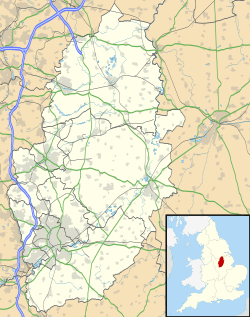Newark Friary facts for kids
| Monastery information | |
|---|---|
| Other names | Newark Greyfriars Newark Observant Friary |
| Order | Franciscan Observant Friars |
| Established | c.1499 |
| Disestablished | 1539 |
| People | |
| Founder(s) | King Henry Tudor (VII) |
| Site | |
| Location | Newark, Nottinghamshire |
| Coordinates | 53°04′40″N 0°48′15″W / 53.077663°N 0.804255°W |
| Visible remains | None |
Newark Friary, also known as Newark Greyfriars, was a special kind of religious house. It belonged to the "Observant Friars," a group of Franciscan monks. This friary was located in the town of Newark, Nottinghamshire, England.
It was started around 1499 by King Henry Tudor. But it was closed down in 1539 by his son, King Henry VIII.
History of Newark Friary
The Newark Friary was founded around the year 1499. It was started by King Henry Tudor, who was a big supporter of the "Friars Observant." These friars were a reformed branch of the Franciscan order. This means they followed the rules of their order very strictly.
When King Henry VII died in 1509, he left £200 to the friary in his will. This was a large sum of money back then. Even though it was founded in 1499, some records suggest the friary might not have been fully set up until 1507.
The Friary's Closure
The Observant Friars group was stopped in 1534. At this time, the Newark Friary was taken over by another group, the Augustinian friars.
However, the friary did not last much longer. It was finally closed down in 1539. This was part of a bigger event called the Dissolution of the Monasteries. During this time, King Henry VIII closed many monasteries and friaries across England.
What Happened to the Site?
In July 1543, the land where the friary stood was given to two people: Richard Andrewes and Nicholas Temple. This included the churchyard and some gardens.
Today, a house called "The Friary" stands on the old site. Sadly, almost nothing is left of the original friary building. Only tiny pieces of the old structure were used in the newer house. The Branston family, who were rich malt makers, later owned this house. One famous member was the cricketer Trevor Branston.
In 1978, some digging work was done at the site. Workers found a cemetery there. But it's not completely clear if this cemetery was directly connected to the friary building.
 | William Lucy |
 | Charles Hayes |
 | Cleveland Robinson |


